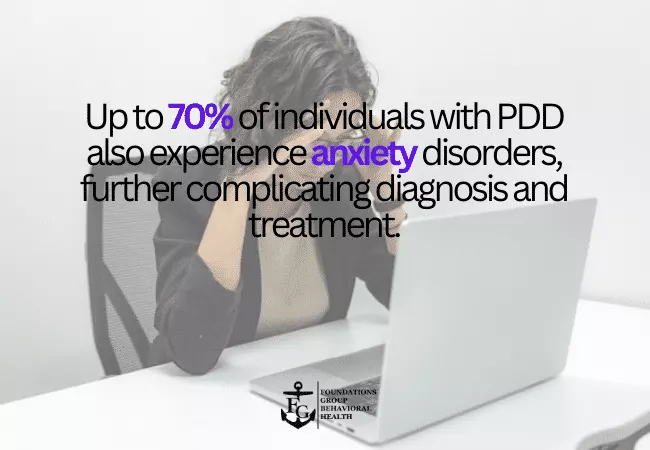High-functioning depression, often classified as persistent depressive disorder (PDD) or dysthymia, is a complex and chronic mental health condition. Unlike major depressive disorder (MDD), individuals with high-functioning depression may not display overtly debilitating symptoms. Instead, they manage to fulfill daily responsibilities—such as going to work, maintaining relationships, and meeting obligations—while secretly battling persistent feelings of sadness, fatigue, and low self-worth.
While this ability to “function” outwardly may seem like a sign of resilience, it often masks the severity of the condition. Left untreated, high-functioning depression can erode an individual’s mental and physical health, strain relationships, and increase the risk of more severe mental health crises, such as major depressive episodes or suicidal ideation.
At Foundations Group Behavioral Health, we specialize in treating conditions like high-functioning depression through our evidence-based programs, including the Psychiatric Day Treatment Program, Half Day Treatment Program, and Outpatient Mental Health Program. By addressing the unique challenges of high-functioning depression, we help individuals lead more fulfilling, balanced lives.
What Is High-Functioning Depression?
High-functioning depression refers to individuals who experience chronic depressive symptoms but continue to maintain outward appearances of normalcy. While they may hold steady jobs, care for their families, and engage in social activities, their internal struggles are profound and persistent.
The symptoms of high-functioning depression often overlap with those of major depressive disorder but are less severe and more enduring. The condition can last for years, often going undiagnosed because individuals—and sometimes those around them—dismiss their symptoms as stress, fatigue, or a lack of motivation.
Symptoms of High-Functioning Depression
The symptoms of high-functioning depression are subtle but pervasive. Over time, these symptoms can significantly impact an individual’s quality of life and well-being:
1. Persistent Sadness or Low Mood
Individuals often experience a constant, underlying sadness or sense of emptiness that persists for months or years. This low mood may not prevent them from functioning but colors their daily experiences.
2. Chronic Fatigue
A lingering sense of exhaustion is common. Even after a full night’s sleep, individuals may feel physically and emotionally drained, making even simple tasks feel overwhelming.
3. Difficulty Concentrating
High-functioning depression often causes cognitive issues, such as trouble focusing, forgetfulness, or indecisiveness. These symptoms can affect work performance and decision-making.
4. Feelings of Inadequacy or Guilt
Individuals frequently feel they are “not good enough” or burdened by guilt over perceived failures. This self-criticism can erode self-esteem and worsen depressive symptoms.
5. Irritability or Frustration
Irritability is a lesser-known symptom of high-functioning depression. Individuals may feel easily frustrated or short-tempered, even in minor situations, straining personal relationships.
6. Changes in Appetite or Sleep
- Appetite: Some people may lose interest in food, leading to unintentional weight loss, while others turn to overeating for comfort.
- Sleep: Chronic insomnia or excessive sleeping (hypersomnia) are common, exacerbating fatigue and affecting daily routines.
7. Social Withdrawal
Although they may fulfill social obligations, individuals with high-functioning depression often feel disconnected or withdraw emotionally from friends and family.
8. Loss of Interest in Activities
A reduced sense of pleasure or interest in hobbies and activities they once enjoyed is a hallmark symptom, often leading to feelings of detachment and apathy.
Why High-Functioning Depression Is Often Overlooked
High-functioning depression often remains undiagnosed for several reasons:
- Normalcy on the Surface: Individuals can maintain jobs, relationships, and routines, leading others—and even themselves—to underestimate the severity of their struggles.
- Minimization of Symptoms: People with high-functioning depression may rationalize their symptoms, attributing them to stress or personality traits.
- Stigma Around Mental Health: The stigma of admitting to mental health challenges often prevents individuals from seeking help.
- Overlap with Other Conditions: The symptoms of high-functioning depression can mimic or coexist with conditions like anxiety, leading to misdiagnosis.
How High-Functioning Depression Impacts Life
High-functioning depression may not appear as debilitating as other forms of depression, but its subtle and persistent nature can profoundly affect various aspects of life. Despite outward appearances of stability and productivity, individuals with high-functioning depression often experience internal struggles that erode their mental, emotional, and physical well-being over time. These challenges can create a ripple effect, impacting work performance, relationships, and overall health.
1. Work Performance and Professional Life
Individuals with high-functioning depression may excel in their careers, often driven by a desire to maintain a sense of normalcy. However, the chronic fatigue, difficulty concentrating, and low self-esteem associated with the condition can significantly affect their performance. Tasks may take longer to complete, decision-making can become impaired, and workplace stress can feel overwhelming.
- Burnout: The persistent effort to keep up appearances while battling inner turmoil often leads to burnout, which can exacerbate depressive symptoms.
- Missed Opportunities: Self-doubt and feelings of inadequacy may prevent individuals from pursuing promotions or new challenges, limiting their professional growth.
2. Personal Relationships
High-functioning depression frequently strains relationships with family, friends, and romantic partners.
- Emotional Withdrawal: Individuals may become distant or disengaged, leaving loved ones feeling confused or hurt.
- Irritability and Frustration: Increased sensitivity and irritability can lead to misunderstandings or conflicts, further isolating the individual.
- Difficulty Expressing Needs: Those with high-functioning depression may struggle to communicate their feelings, leading to a lack of support or misinterpretation of their behavior.
3. Physical Health
Depression doesn’t only affect the mind; it takes a toll on the body as well. High-functioning depression is linked to a range of physical health issues, including:
- Chronic Fatigue: Persistent tiredness can make physical activity and self-care difficult, contributing to a sedentary lifestyle.
- Weakened Immune System: Chronic stress and depression are associated with a weakened immune response, making individuals more susceptible to illnesses.
- Increased Risk of Chronic Conditions: Conditions such as heart disease, high blood pressure, and digestive issues are more common among individuals with untreated depression.
4. Loss of Joy and Fulfillment
One of the most profound impacts of high-functioning depression is the gradual erosion of joy and fulfillment in life. Individuals may lose interest in hobbies or activities they once loved, feel disconnected from their achievements, and struggle to find meaning in everyday experiences. Over time, this lack of engagement can lead to feelings of emptiness and despair.

Treatment Options for High-Functioning Depression
Seeking professional help is critical for managing high-functioning depression. At Foundations Group Behavioral Health, we offer comprehensive treatment programs tailored to address the unique challenges of this condition:
1. Psychiatric Day Treatment Program
This structured program provides intensive therapeutic interventions during the day, allowing individuals to return home in the evening. It’s ideal for those needing significant support without the commitment of inpatient care.
2. Half Day Treatment Program
A flexible option designed for individuals who require part-time care, the Half Day Treatment Program offers focused therapy while accommodating work, school, or family responsibilities.
3. Outpatient Mental Health Program
For those with milder symptoms or transitioning from intensive care, our outpatient program provides ongoing support and therapy in a less restrictive environment.
4. Depressive Disorder Treatment Program
Our specialized program addresses the root causes of depression using evidence-based therapies such as cognitive-behavioral therapy (CBT), dialectical behavior therapy (DBT), and mindfulness-based approaches.
5. Co-Occurring Disorder Treatment Program
Many individuals with high-functioning depression also experience conditions like anxiety or substance use. Our integrated approach ensures simultaneous treatment for all co-occurring disorders.
6. Anxiety Treatment Program
High-functioning depression often overlaps with anxiety disorders. Our tailored program helps individuals manage both conditions through relaxation techniques, coping strategies, and therapy.
7. Bipolar Disorder Treatment Program
For those with mood instability that coexists with depression, our program focuses on stabilizing emotions and improving overall mental health.
Why Early Intervention Matters
High-functioning depression is often overlooked because individuals appear to be coping with their responsibilities. However, the “high-functioning” label can be misleading, as it doesn’t account for the emotional and mental toll the condition takes. Early intervention is critical for preventing the condition from worsening and helping individuals reclaim their mental health and quality of life.
1. Preventing Escalation
Without timely treatment, high-functioning depression can escalate into more severe mental health challenges, such as major depressive disorder or suicidal ideation. Early intervention addresses the root causes of depression before symptoms worsen, reducing the risk of a mental health crisis.
2. Breaking the Cycle of Negative Thinking
High-functioning depression often involves persistent negative thought patterns that reinforce feelings of inadequacy and hopelessness. Early therapy, such as cognitive-behavioral therapy (CBT), can help individuals reframe these thoughts and develop healthier coping mechanisms.
3. Protecting Physical Health
Chronic depression is closely linked to physical health issues, including cardiovascular disease, obesity, and chronic pain. Addressing depression early reduces the stress burden on the body, improving overall health and longevity.
4. Restoring Emotional Connections
Early treatment helps individuals rebuild relationships by addressing emotional withdrawal and irritability. Through therapy and support, individuals can improve communication skills and foster stronger connections with loved ones.
5. Improving Work-Life Balance
With proper treatment, individuals can regain focus, energy, and confidence, improving their productivity and satisfaction at work. This renewed sense of balance can help prevent burnout and restore motivation.
6. Enhancing Overall Quality of Life
Perhaps most importantly, early intervention enables individuals to rediscover joy and purpose in life. By addressing the underlying causes of high-functioning depression, treatment empowers individuals to pursue their passions, strengthen relationships, and achieve their goals.
Foundations Group Behavioral Health: A Partner in Healing
At Foundations Group Behavioral Health, we understand that high-functioning depression is as serious as any other mental health condition, even if it’s not immediately apparent. Our compassionate, multidisciplinary team provides personalized care to address the unique needs of each individual.
Our Behavioral Health Treatment Center in Massachusetts offers a range of programs, from the Psychiatric Day Treatment Program to outpatient services, ensuring that individuals at every stage of their journey receive the support they need.
Take the First Step Today
If you or a loved one is struggling with high-functioning depression, don’t wait to seek help. Contact Foundations Group Behavioral Health to learn more about our evidence-based programs and start the journey toward healing and recovery.
Together, we can help you move from just functioning to truly thriving. Call us at 888.685.9730 to start your journey to a mindful future.
FAQ on High-Functioning Depression
What is high-functioning depression?
High-functioning depression, also known as persistent depressive disorder (PDD) or dysthymia, is a chronic form of depression where individuals manage daily responsibilities but struggle internally with persistent sadness, fatigue, and low self-esteem.
How is high-functioning depression different from major depression?
While major depressive disorder (MDD) often causes severe symptoms that disrupt daily life, high-functioning depression is characterized by less intense but long-lasting symptoms that allow individuals to maintain productivity while feeling persistently unwell emotionally.
What are the common symptoms of high-functioning depression?
Symptoms include chronic sadness, fatigue, difficulty concentrating, feelings of inadequacy, irritability, changes in appetite or sleep patterns, social withdrawal, and loss of interest in previously enjoyable activities.
How does high-functioning depression impact daily life?
Despite maintaining work and personal responsibilities, individuals with high-functioning depression often experience strained relationships, reduced work performance, physical health issues, and a diminished sense of joy or fulfillment.
Why is high-functioning depression often overlooked?
The condition is frequently overlooked because individuals appear to be functioning well outwardly. They may downplay their symptoms or attribute them to stress, making it harder for others—and sometimes themselves—to recognize the need for help.
What are the risks of leaving high-functioning depression untreated?
Untreated high-functioning depression can escalate into major depressive episodes, increase the risk of physical health problems, and lead to suicidal thoughts or behaviors.
How can high-functioning depression be treated?
Treatment options include therapy, such as cognitive-behavioral therapy (CBT), medication, and structured programs like the Psychiatric Day Treatment Program, Half Day Treatment Program, and Outpatient Mental Health Program offered at Foundations Group Behavioral Health.








